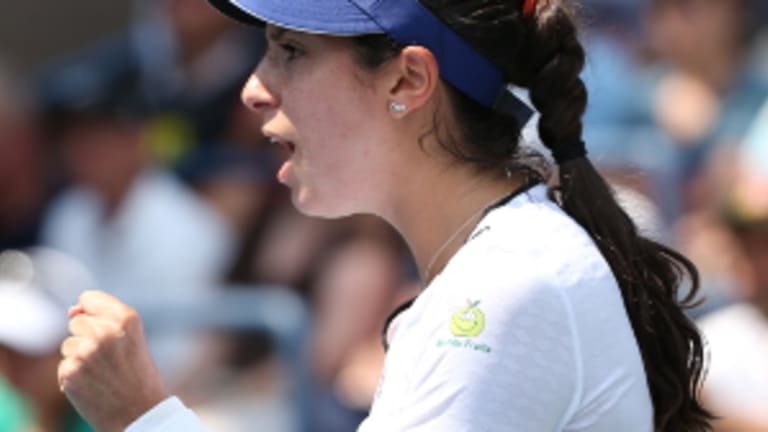NEW YORK—On the first-set changeover at 4-3, with Christina McHale leading Julia Goerges by a break, McHale pulled a new racquet from her bag. It was sheathed in plastic, the way the stringers now deliver them to the players. McHale, who was sitting, unwrapped the grip end and held the racquet over her shoulder, expecting one of the many ball kids hovering around to pull the plastic bag off and dispose of it.
It was a rather regal gesture, like that of a queen who merely extends her hand, expecting one of her minions to immediately relieve her of an empty goblet. Only there was no ball kid there. McHale half-turned in her chair, a gesture like clearing her throat. Finally one of the kids caught on and did his duty.
Okay, McHale is a youngster, barely 21. She’s seen players like Serena Williams and Roger Federer do the same thing. (I’ve always secretly hoped one of the kids would have the gumption to glare at the pampered pro and snap, “Take your own danged bag off.”) It’s just another entitlement in a culture that breeds them, and it opens a little window on how easy it is to get lost in the funhouse of the pro tour.
McHale seems a pretty good example of someone who has gotten turned around among all those distorting mirrors, although a bout of mononucleosis at the end of last year was certainly a factor (in her own view, the main factor) in her fall from a career-high ranking of No. 24 last August to her current No. 114.
Fact is, a fair number of observers think that McHale, like so many players before her, shot up quickly but then found herself on a plateau, unable to advance higher. Yet the taste of success was so new—and so easily taken for granted—that she wanted to make things happen, and had no shortage of official and unofficial advisers to nudge her along that path. It can get awfully confusing for someone as young as McHale.
Once a USTA charge, McHale left the Player Development program in October and returned to the coach of her youth. Then she developed mono. She’s healthy now, and also appears headed back into the USTA fold.
“I don’t think my coaching so much factored into it,” McHale said of her slump, after wrapping up a confidence-boosting first-round win over Goerges, 6-4, 6-3. “It’s just like I lost my confidence when I got sick and had to take time off. (Now) I’m working with my old (USTA) coach Jorge Todero for this tournament. I still talk to my old coaches as well, it’s kind of a combination.”
Wherever the reality lies, the past year has been, or certainly ought to have been, a learning experience for McHale. And now she appears well on her way back. “I would say I started the year and I was over the mono, but I still didn’t feel physically I was back at full strength. But a couple of months into the year I felt like I was physically fine.”
Yet her game was so slow coming around that you had to wonder what else might have been going on. Until today, she had exactly one win since the Rome tournament in mid-May, and that was at Wimbledon over fellow American and thenTA No. 147 Alexa Glatch. She actually won more matches while suffering from mono—two—after the 2011 Olympics than in this last dismal stretch.
This wasn’t just a slump; this was nothing less than a resounding crash. And today she may have taken a first steps away from the wreckage.
This was an intriguing match-up, because Goerges has also struggled of late. The 26-year-old German hit a career-high ranking of No. 15 in March of 2012, but since then she’s slipped down to No. 45. So while McHale was searching for the consistency and mental toughness that had abandoned her, Goerges was on the hunt for the bold, almost insolent shot-making ability that had once defined her as one of the most dangerous and volatile of WTA players.
